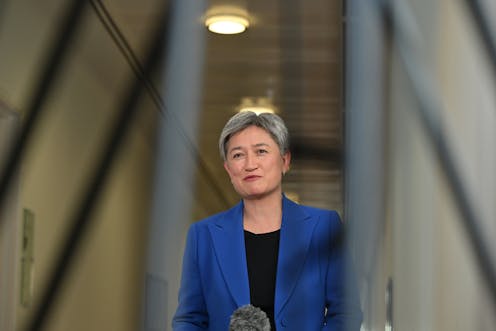
Australia’s relations with China will take another major step forward this week with Foreign Minister Penny Wong travelling to Beijing for the resumption of the bilateral Foreign and Strategic Dialogue, which has been on hold since 2018.
The latest breakthrough follows the meeting between Prime Minister Anthony Albanese and President Xi Jinping on the sidelines of the G20 summit.
Wong’s Wednesday talks coincide with the 50th anniversary of the Whitlam government establishing diplomatic relations with China on December 21 1972 – an anniversary the Chinese government had been indicating it wanted to mark. They are also part of a round of meetings with foreign ministers that China is conducting.
Australian exporters will hope the meeting paves the way to China easing the trade restrictions it has imposed on Australia. The improved relations may also be positive for detained Australians Cheng Lei and Yang Hengjun.
In a statement Albanese and Wong said: “In 1972, then Prime Minister Gough Whitlam took a bold decision, recognising the importance of engagement and cooperation between our two nations and peoples.
"In the decades since, China has grown to become one of the world’s largest economies and Australia’s largest trading partner.
"Trade between Australia and China, as well as strong people-to-people, cultural and business links have delivered significant benefits to both our countries.”
They said Wong was going to Beijing at the Chinese government’s invitation “to meet China’s State Councilor and Minister of Foreign Affairs, Wang Yi, and hold the 6th Australia–China Foreign and Strategic Dialogue”.
Albanese and Wong said they welcomed the opportunity to mark the anniversary of diplomatic relations.
“Australia seeks a stable relationship with China; we will cooperate where we can, disagree where we must and engage in the national interest.”
Albanese flagged this latest breakthrough on Friday’s podcast with The Conversation, although he did not specify the form it would take.
He said: “China is our major economic partner and I think in coming weeks you will see further measures and activities which indicate a much-improved relationship, which is in the interests of both of our countries, but importantly as well is in the interests of peace and security in the region.”
The thawing in relations, which began with overtures from China as soon as Labor was elected, came after the Chinese government had previously refused to even return the Morrison government’s phone calls.
China had been angered by the Coalition’s tough line on foreign interference and by its harsh rhetoric, for which then defence minister Peter Dutton was notable. Australia’s pressure for an inquiry into the origins of COVID-19 was a high-profile source of tension.
The Albanese government has been aware of the need for caution as it looks to stabilise the relationship, repeatedly making it clear Australia would not give any concession to get an improvement.
Shadow foreign minister Simon Birmingham said the Coalition welcomed Wong’s plans to visit.
“Engagement between governments is essential to advance areas of mutual interest and to manage differences,” he said, but added that “the ultimate test of any dialogue lies in the outcomes achieved”.
“Minister Wong’s visit will be judged on progress towards the removal of unwarranted tariffs and sanctions on Australian exports; achieving fair and transparent treatment of Australians currently detained in China; advancing regional security via respect for international law; and securing greater transparency on human rights issues of concern,” Birmingham said.
“Australia should also continue to appeal for China to use its influence on Russia to end the immoral and illegal invasion of Ukraine.”
Birmingham said the Wong visit would be the first by an Australian minister since his final visit as trade minister in November 2019.
Michelle Grattan does not work for, consult, own shares in or receive funding from any company or organization that would benefit from this article, and has disclosed no relevant affiliations beyond their academic appointment.
This article was originally published on The Conversation. Read the original article.







